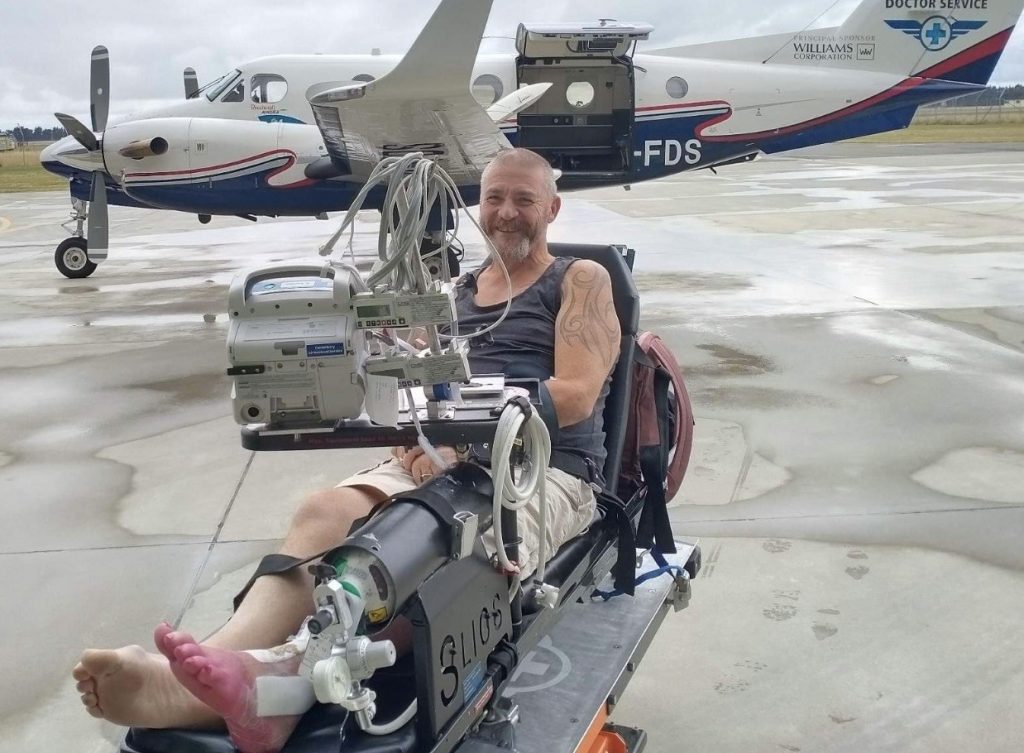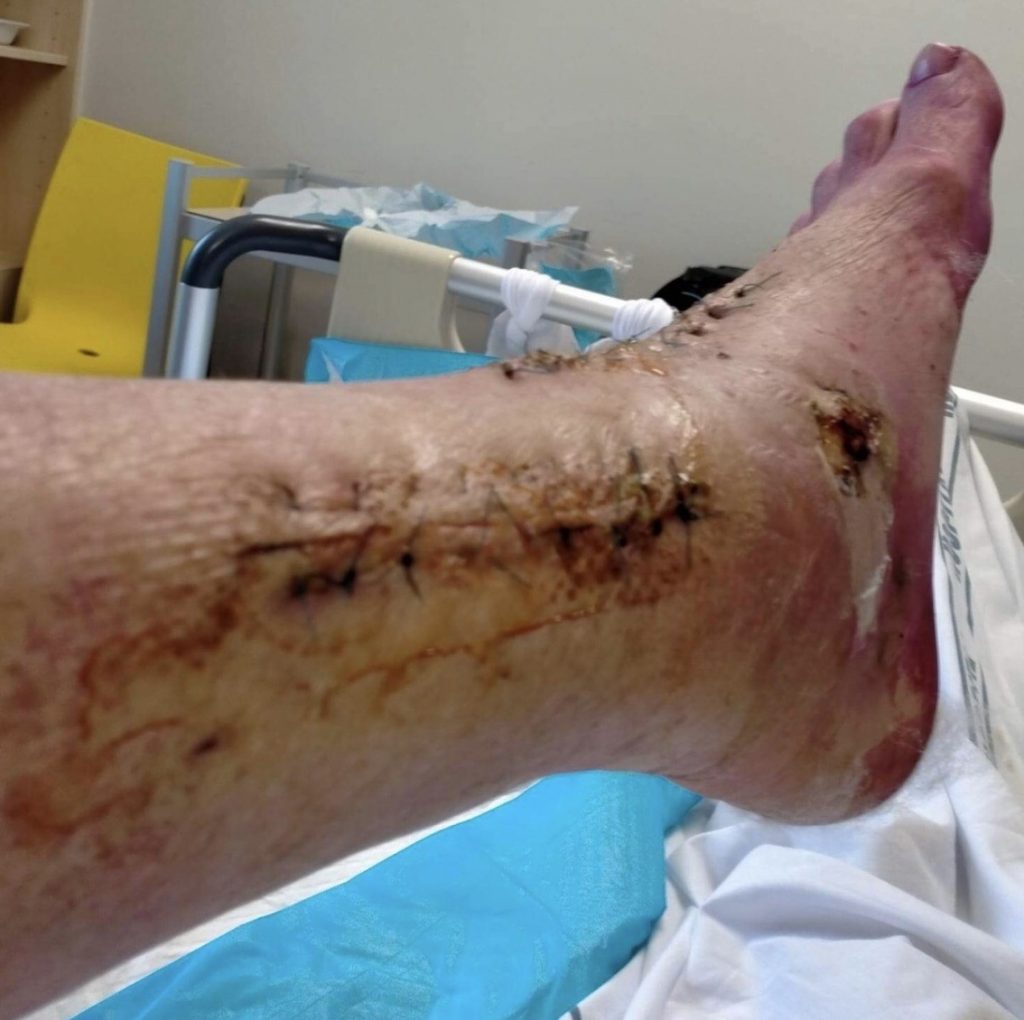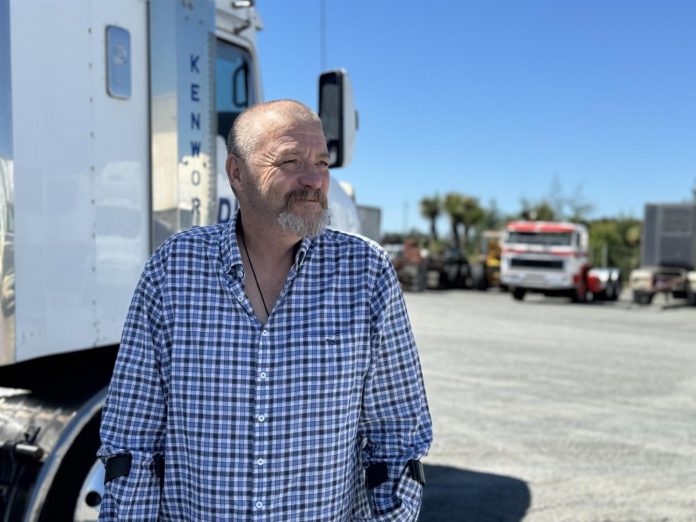Ashburton’s Jason Steele has had a year from hell, as he almost lost his life from a superbug infection then battled with ACC.
The 54-year-old is glad he has left 2023 behind as he now looks to the future.
His journey began when he slipped while climbing down a ladder from the rear of his truck’s trailer.
The iDL Transport driver hit the inside of his left ankle on the bottom rung of the ladder, grazing his skin through his work sock and above his work boot.
‘‘I gave a swear word and got in my truck and carried on,’’ Jason said.
The accident occurred in Napier. After arriving home to Lake Hood the next day, he went to bed then woke about three hours later soaked in sweat, with his ankle having become sore and swollen. He went to Ashburton Hospital’s acute assessment unit. His temperature was high, so he was kept in overnight. Blood tests and a biopsy of fluid from his ankle did not indicate anything serious. He was diagnosed with
gout, and sent home with a prescription for anti-inflammatories. The doctor considered his high temperature was unrelated.
‘‘He explained there was a chance that I had flu.’’
Jason took the doctor’s word for it, but felt uneasy about the diagnosis of gout. He’d had gout once before, about 18 years ago, in a big toe.
It was not as painful or swollen as his ankle was. And he didn’t feel like he had the flu.
Over the coming days, his ankle remained sore and swollen, and his temperature high.
While spending time with wife Janis and their teenage daughter over the 2022 Christmas break in the North Island, Jason’s condition deteriorated.
‘‘The pain was incredible in my ankle, my friend had Tramadol, I was eating those like they were jellybeans.’’
On December 28, which was one week after the ankle injury, he went to Tauranga Hospital’s emergency department. While sitting in a cubicle waiting to be seen after some initial tests, he started shaking uncontrollably and having convulsions.
This was an attack of rigors in response to an infection, which tests soon showed was MRSA, a potentially deadly hospital-borne septicaema superbug.
As well as infecting his blood, the bacteria was causing septic arthritis, as it ate into his ankle joint, bone marrow and tibia.
That night, he underwent what would be the the first of five surgeries at Tauranga, needed to flush out the infection. He spent three weeks bedridden at the hospital, where there were discussions about amputating his leg below the knee.
Jason was airlifted to Christchurch Hospital to be closer to home, where he underwent two more flush surgeries.

Ultimately he would need major surgery, but after three weeks in Christchurch he was able to go home, with a moon boot and crutches, as well as a PICC line for intravenous antibiotics in his arm.
During his six weeks in hospital, there had been another battle going on for Jason. When he was conscious, Jason would phone ACC.
‘‘In my first week at Tauranga Hospital, I started the process of applying to ACC for support, as I was told by the doctor that I had likely contracted MRSA from the abrasions on my ankle from the slip from my trailer,’’ he said.
‘‘The whole time I was in hospital, I was chasing them because I had no money coming in. I did all the chasing, I still had no case manager assigned to my file so every time I phoned the 0800 number I had to explain my story again.’’
In March last year, about one month after he was discharged from hospital, ACC informed him it would not cover him for loss of wages, claiming medical evidence found his infection was unrelated to an injury.
Jason was devastated.
‘‘I had to borrow money off my 70-year-old parents so I could pay the rates, I had to go to MSD. It’s been demoralising to be honest.’’
ACC had advised Jason to instead apply to the Ministry of Social Development for funding.
Jason did that and qualified for just $16 per week, the amount being this low due to Janis being in full-time employment.
He said his dealings with ACC left him feeling frustrated, angry and ‘‘broken’’.
‘‘There were stages there I was literally broken, because I didn’t know if I could put food on the table,’’ he said.
‘‘I just feel like I have been kicked in the teeth by the system.’’
Jason had not been able to return to his dream career as a truck driver, as his condition of septic arthritis became chronic osteomyelitis, which would take months to cure.
But throughout his illness, his iDL Transport boss had been able to accommodate him with an office role, in operations.
‘‘I honestly don’t think I could have survived without my boss giving me the office job,’’ he said.
Jason gave more detail on ACC’s basis for declining his claim.
He said the organisation claimed the MRSA and septic arthritis had been the result of an infected boil which he had received treatment for at Ashburton Hospital, three weeks prior to his visit to the acute admissions unit for his ankle.

The boil had been on his upper left leg, and had required treatment with antibiotics.
ACC believed the MRSA blood infection came from the boil and settled in his ankle.
While conceding this is possible, Jason believes it is more likely he contracted the MRSA from his ankle injury rather than the boil.
This was because blood tests after his boil treatment showed no sign of infection.
Strengthening ACC’s case was the fact the duty doctor made no mention of the graze on Jason’s ankle in his hospital notes when Jason initially presented to Ashburton Hospital.
And the hospital notes do not describe an accident.
Jason said this was an omission by the doctor, as he had informed the duty doctor about his accident, and the graze was easy to see.
Jason said even if ACC was right, and the infection did come from the boil, this was something the duty doctor should have given consideration to when he presented to the hospital.
If the doctor had done this and given a correct diagnosis, rather than a misdiagnosis of gout, Jason believed then he could have got the correct treatment straight away, and he may never have developed septic arthritis.
He believed in this case, ACC should view the septic arthritis as an injury resulting from omission of treatment, that omission of treatment being due to the misdiagnosis.
‘‘During this whole life-changing experience I have found my treatment by ACC appalling,’’ Jason said.
Jason is seeking cover of his wages for 12 weeks, covering his first six weeks in hospital, and six weeks of recovery time which followed after two major surgeries.
The surgeries were for a graft from his pelvis to replace destroyed bone in his ankle, and to install a Siddiqui frame, or halo, on his leg.
Two weeks after the bone graft surgery in September, the surgeon phoned to tell Jason he had finally beaten the chronic osteomyelitis infection. Jason said he had been overwhelmed with relief.
‘‘I cried, I seriously cried,’’ he said.
The halo was on for six months; it was removed in October and replaced with a cast. Last month he moved to a moon boot.
He said it had been ‘‘awesome’’ to leave behind the halo, then the cast, not to mention his many months of painful recovery.
‘‘It’s a sad thing when you get excited about a moon boot on your foot!’’ he joked.
‘‘It’s been brilliant – sleeping at night, showering, and no longer the pain factor,’’ he said.
Jason expects to make a full recovery, but is likely to have arthritic pain in his ankle for the rest of his life.
He has sought a review of his case with ACC, which the organisation began in September.
ACC deputy chief executive – service delivery Amanda Malu told The Ashburton Courier a hearing with an external review provider was booked for the end of next month.




